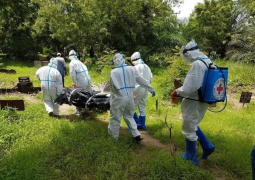
Speaking at NEA’s yesterday high-level national inception convergent of the global development project for the review and update of the National Implementation Plan (NIP) on Persistent Organic Pollutants (POPs), Dr. Badjie revealed that World Health Organisation’s (WHO) report on the public health impact of chemicals published in 2016 estimated that 12.6 million people died as a result of living or working in an unhealthy environment.
The meeting, held at the Sir Dawda Kairaba Jawara International Conference Centre is being held to map out national strategies for the implantation of the project and as well to identify roles and responsibilities for every stakeholder.
"The second largest contributor to global mortality could be prevented by reducing or removing exposure to chemicals such as ambient air pollution, household air pollution and second-hand smoke,” the NEA boss quoted WHO report as saying.
The report further stated that chemicals such as heavy metals, pesticides, solvents, paint, detergent, kerosene, carbon monoxide and drugs led to unintentional poisoning at home and workplaces. Unintentional poisoning has been estimated to cause 198, 000 deaths annually with a major part being from preventable chemical exposure.
He went on to explain that the accident and incidents associated with chemicals such as pesticides used in the country revealed 29 poisoning cases which 8 were fatal, and 7 of the 8 deaths were male.
"The report disclosed that 52% of males have issues as a result of their agricultural occupation and being pesticide applicators. However, most pesticide poisoning incidents and accidents are not formally reported. Because of this dynamic and complexity of the environment, the country needs to reflect on the current realities at national and global levels, particularly on sound management of chemicals," he pointed out.
Rohey John Manjang, Minister of Environment, affirmed that the government of the Gambia in partnership with the Global Environment Facility, United Nations Environment Programme and Africa Institute is implementing the next NIP project in fulfilment of its commitment under Article 7 of the Second Convention on POPs which is primarily aimed at protecting human beings and the environment from.
She stated that the Gambia ratified the Second Convention in June 2003 as part of its response strategy towards addressing the harmful effects of exposure to POPs, particularly the health hazards it poses to women and children.
"Recognising that some of these chemicals are essential in the development of the Gambia's growing industry and the agricultural sector, the ratification of the convention was followed by strengthening the country's legislation, regulations and institutional frameworks, thus allowing the sustainable and safe use of these chemicals in support of our National Development Agenda," she said.
The Minister further highlighted that the current global NIP project is aimed at assisting participating countries in compiling their mid-update and national reporting obligation under the second convention while addressing national challenges in managing POPs. She added that the current NIP development project will reduce countries' dependency on external expertise and resources to develop their mid-update by strengthening the political environment and technical capacity of participating countries including The Gambia.
"The project has five components and component three is the development, review and update of the Gambia's National Implementation Plan. These shall be executed entirely by The Gambia," she promised.
Dr. Dawda Badgie, executive director of NEA, emphasised that exposure to various chemicals occurs every day and through multiple roots such as injection, inhalation and skin contact. He said some chemicals might be viewed as harmless or even beneficial while others are threats to our health and environment.





